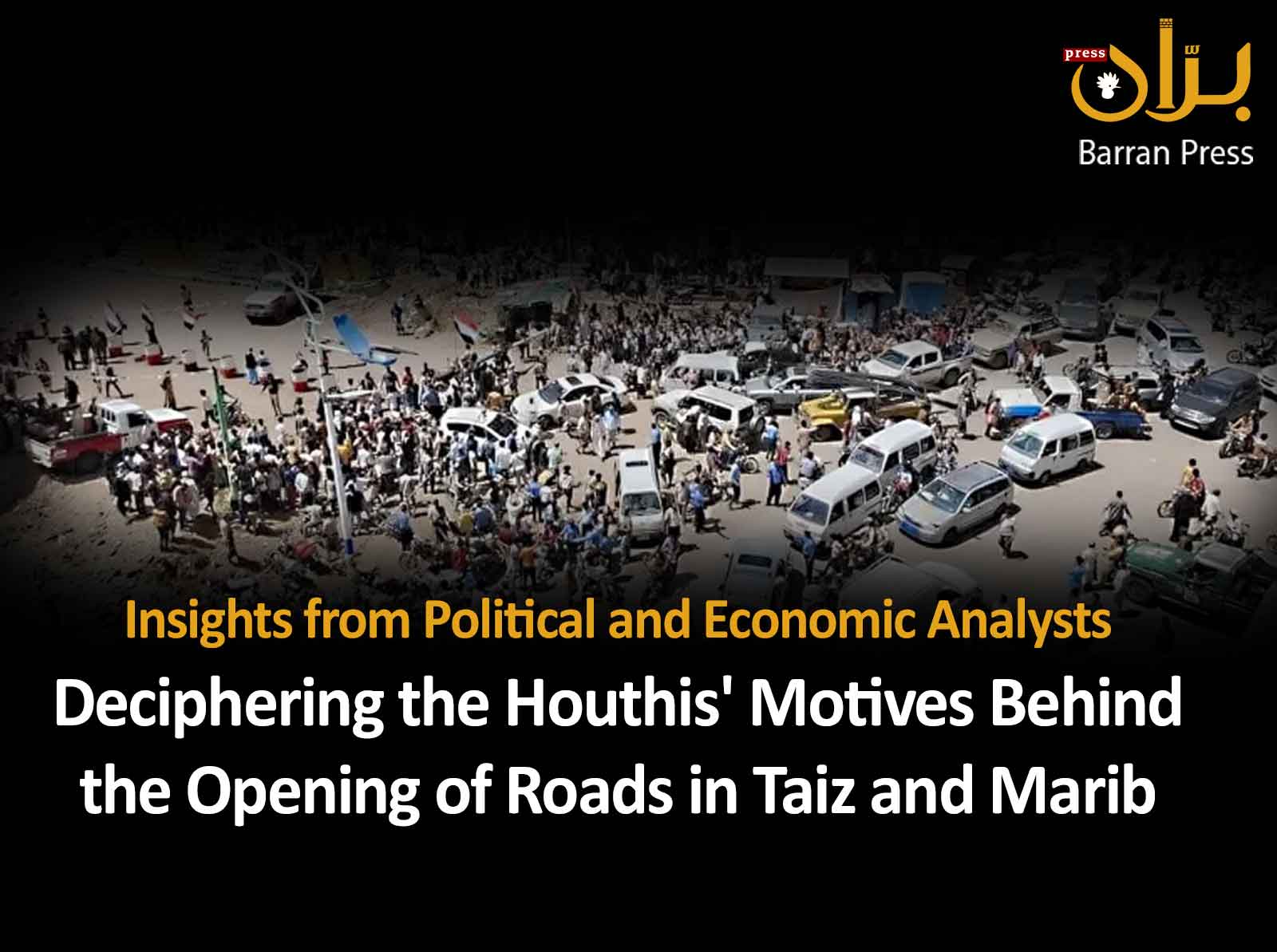


Barran Press
The Houthi group, internationally designated as a terrorist organization, has recently surprised observers by opening some roads in the Taiz and Marib governorates, a move they had adamantly refused for the past decade. Political and economic analysts have been examining the motives behind this unexpected response from the Houthi group.
Many analysts believe that the Houthis' partial opening of roads is connected to recent decisions made by the Central Bank of Yemen in Aden, which declared the temporary capital of the country. These decisions involved relocating the bank's main headquarters from Sanaa to Aden and setting a deadline for dealing with the old paper currency, a move that has been seen as a severe blow to the Houthis.
Some interpretations suggest that the Houthi group intends to exploit the opening of roads for smuggling hard currency from government-controlled areas rather than to alleviate the suffering of the Yemeni people or respond to international efforts for peace in the country.
On June 20, 2024, the Taiz Military Axis, affiliated with the Yemeni army, issued strict instructions to implement recent decisions and directives from the Central Bank of Yemen regarding currency regulations and its entry and exit from different governorates controlled by the internationally recognized Yemeni government and those under Houthi control.
These instructions reveal the security and military authorities' concerns in Taiz that the Houthis might exploit the newly opened route for currency smuggling and to mitigate the effects of the Central Bank's decisions. The bank had given a 60-day deadline to deposit pre-2016 editions of the national currency at any of its branches in the governorates.
Multiple Motives
Political analyst Yassin Al-Tamimi explained to Barran Press that the Houthi group's decision has various motives. He views their response to opening roads in Taiz and Marib as part of a public relations campaign aimed at demonstrating the group's commitment to peace efforts, despite evading such steps in the past years.
Regarding recent economic decisions, Al-Tamimi acknowledged their painful and unexpected blow to the Houthis, noting that they would directly impact the group's future economic capabilities. He suggests that the Houthis seek to alleviate the material and moral barriers they previously imposed to circumvent the legitimate government's monetary policy.
According to Al-Tamimi, these new policies pose a threat to the group and undermine the gains they achieved through regional and international collusion.
Currency Smuggling
Journalist and economic analyst Najeeb Al-Adoufi considers the Central Bank of Yemen's decisions in Aden as crucial for managing monetary policy, protecting the banking sector, and safeguarding client deposits. He sees these decisions as a significant step toward ending the monetary division.
Al-Adoufi believes that the Houthis' sudden initiative to open roads in Taiz and Marib aims to facilitate currency smuggling into their controlled areas and alleviate economic pressure, especially concerning financial transfers. The Aden Central Bank recently imposed sanctions on six banks as punitive measures for their refusal to relocate their operations to Aden, further intensifying the economic strain on the Houthis.
By opening roads, the Houthis can acquire foreign currency from government-controlled areas and receive foreign remittances, effectively bypassing the ban imposed on them. Al-Adoufi also highlights the Houthis' attempts to counter the Central Bank's decisions through issuing futile rulings from their centers in Sanaa, which remain under their control.
Relief of Pressure
Economic expert and analyst Fares Al-Najjar concurs that the Houthis' decision to open roads is a response to recent economic pressure exerted on the group. This pressure includes decisions related to bank relocations, regulations on internal and external transfers, and hints at discontinuing the use of the old currency to address distortions in the banking sector.
Al-Najjar suggests that the Houthis are now attempting to benefit from the opening of roads to alleviate the burdens they face. Additionally, he believes that the road opening serves as a public relations move to portray the group as a peace initiator, especially in light of the resentment directed at them for their actions in the Red Sea. It is notable that the Houthis claim to defend the Palestinian cause while besieging the Yemeni people and Taiz for years.
Furthermore, Al-Najjar states that the Houthis aim to acquire as much of the old currency as possible since the stock they possess is nearly depleted. They seek to maintain financial stability and resilience by accumulating the old currency, as it is of better quality and can withstand potential decisions by the Central Bank, such as discontinuing its use.
Fleeing
Not far away, the head of the Abaad Center for Studies, Abdul Salam Muhammad, said, “What the Houthis are doing now in opening the roads is an escape from social pressure, people’s pressure, their miserable situation and the collapse of the economic situation, as well as an attempt to restore the social incubator before the war.”
He added in a statement to “Bran Press” that “the Houthis are planning a big war.” As part of the war, according to Abdel Salam, they want, for example, in Taiz to go to Mocha and Bab al-Mandab.
To achieve this, researcher Abdul Salam says, the Houthis must “restore part of the social incubator, reduce the escalation with the Islah Party, and anesthetize the international community and the media with some measures.” In his opinion, all of these measures are “preludes to war.”
Regarding the Central Bank’s measures regarding the currency, Abdul Salam Muhammad indicated that its damage will be “great for the Houthis in the short, medium and long term.”